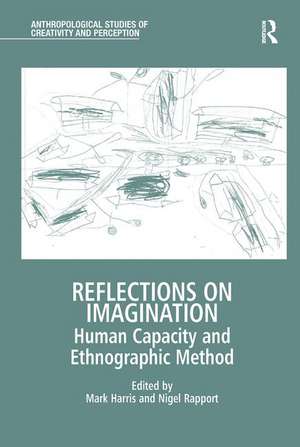Reflections on Imagination: Human Capacity and Ethnographic Method: Anthropological Studies of Creativity and Perception
Editat de Mark Harris, Nigel Rapporten Limba Engleză Paperback – 18 dec 2017
| Toate formatele și edițiile | Preț | Express |
|---|---|---|
| Paperback (1) | 356.44 lei 6-8 săpt. | |
| Taylor & Francis – 18 dec 2017 | 356.44 lei 6-8 săpt. | |
| Hardback (1) | 1008.97 lei 6-8 săpt. | |
| Taylor & Francis – 28 apr 2015 | 1008.97 lei 6-8 săpt. |
Preț: 356.44 lei
Nou
Puncte Express: 535
Preț estimativ în valută:
68.21€ • 70.95$ • 56.31£
68.21€ • 70.95$ • 56.31£
Carte tipărită la comandă
Livrare economică 14-28 aprilie
Preluare comenzi: 021 569.72.76
Specificații
ISBN-13: 9780815347200
ISBN-10: 0815347200
Pagini: 316
Dimensiuni: 156 x 234 x 20 mm
Greutate: 0.45 kg
Ediția:1
Editura: Taylor & Francis
Colecția Routledge
Seria Anthropological Studies of Creativity and Perception
Locul publicării:Oxford, United Kingdom
ISBN-10: 0815347200
Pagini: 316
Dimensiuni: 156 x 234 x 20 mm
Greutate: 0.45 kg
Ediția:1
Editura: Taylor & Francis
Colecția Routledge
Seria Anthropological Studies of Creativity and Perception
Locul publicării:Oxford, United Kingdom
Notă biografică
Mark Harris is Reader in Social Anthropology and Head of the Department of Anthropology at the University of St Andrews, UK. He is the author Life on the Amazon: The Anthropology of a Brazilian Peasant Village, and Rebellion on the Amazon: Race, Popular Culture and the Cabanagem in the North of Brazil, 1798-1840, the editor of Ways of Knowing and co-editor of Some Other Amazonians. Nigel Rapport is Professor of Anthropological and Philosophical Studies and Director of the Centre for Cosmopolitan Studies at the University of St. Andrews, UK. He is the author of Transcendent Individual: Towards a Literal and Liberal Anthropology, The Trouble with Community: Anthropological Reflections on Movement, Identity and Collectivity, 'I am Dynamite': An Alternative Anthropology of Power, Social and Cultural Anthropology: The Key Concepts, and Of Orderlies and Men: Hospital Porters Achieving Wellness at Work and editor of Questions of Consciousness, British Subjects: An Anthropology of Britain, and Democracy, Science and The Open Society: A European Legacy?
Recenzii
’An important and timely volume that brings together different perspectives on the surprisingly little explored topic of the imagination. In its ambitious scope and rich ethnographic detail, it promises to become essential reading for anthropologists and those working in related fields of enquiry.’ Anna Grimshaw, Emory University, USA ’Arguably the single faculty that sets humanity most decisively apart from the rest of the animal kingdom, the imagination enters into our lives at every stage, enabling humans to create invisible connections, conjure up possible and impossible worlds, expand their horizons and produce metaphors and theories. This strikingly original volume convincingly demonstrates the importance of the imagination in ethnographic observation, anthropological analysis and the local lives under scrutiny. It showcases anthropology as a fundamental humanistic discipline.’ Thomas Hylland Eriksen, University of Oslo, Norway ’The contributors to this intriguing collection of essays criss-cross the terrain designated by the English terms imagination, the imagined, and the imaginary, and their (approximate) equivalents in other languages. The reader is guided helpfully through a variety of learned genealogies of the imagination and treated to much evocative ethnography. Classic views, going back to Kant and beyond, are brought into conversation with the most contemporary anthropological theory, and anyone who aspires to practise ethnography will be challenged to rethink the role of the imagination in that rather peculiar enterprise. Highly recommended.’ David N. Gellner, University of Oxford, UK
Cuprins
I: Introduction; 1: ‘Imagination is in the Barest Reality'; 2: From the River; II: Case Studies; II: Imagination, Methodology, Ethnomethodology; 3: Re-Imagining Ethnography 1; 4: Tango Heart and Soul; Imagination, History, the Uncanny; 5: Historical Imagination and Imagining Madness; 6: Hauntings; Imagination, Materiality and Consciousness; 7: Reflections on the Encounters of the Imagination; 8: Granite and Steel; II: Imagination and Social Imaginaries; 9: Uses of Finland in Japan's Social Imaginary; 10: The Social Imaginary and Literature; II: Imagination, Scale, Otherness; 11: The Imagining Life; 12: Do Forest Children Dream of Electric Light? An Exploration of Matses Children's Imaginings in Peruvian Amazonia; Imagination, Perspective, Emergence; 13: Infrastructural Imaginaries; 14: Imagination/Making; III: Review; 15: Afterword
Descriere
In this innovative volume, anthropologists turn their attention to a topic that has rarely figured as a focus of concerted investigation. Yet it can be described as an intrinsic aspect of all human knowing. The imagination is part of all processes by which human beings process information about themselves, their identities, their environments and their relations. How do anthropologists use imagination in coming to know their research subjects? How might they, and how should they, use their imagination? And how do research subjects themselves understand, describe, justify and limit their use of the imagination?











